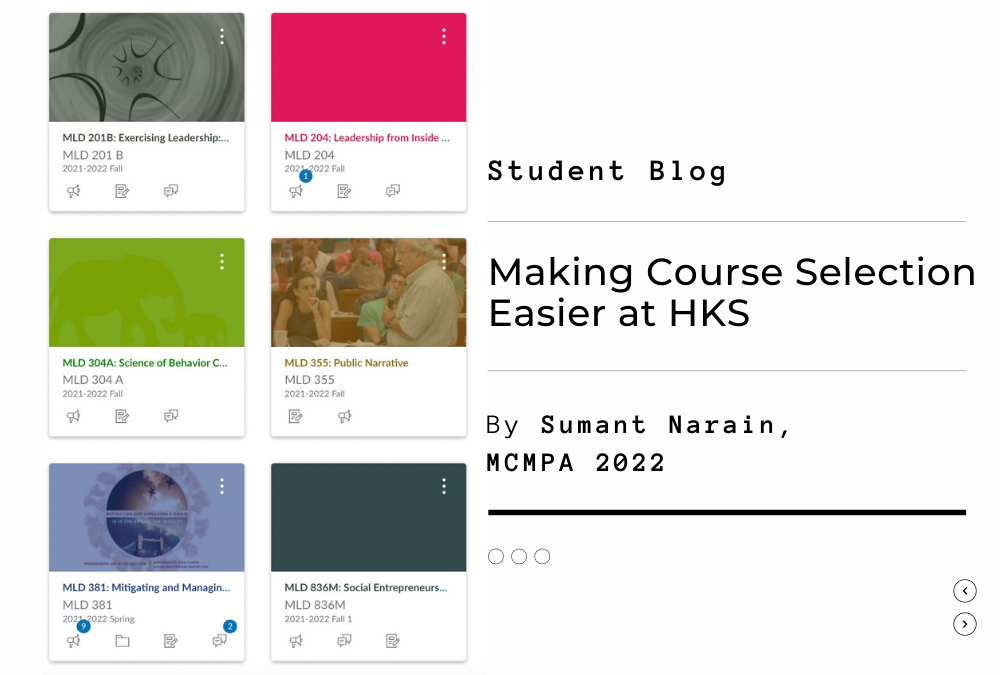It was the start of the academic year at Harvard Kennedy School (HKS) in August 2021. Nikoli* – a civil servant from Croatia and a mid-career Master in Public Administration (MCMPA) candidate – was already finding it tough to acclimate to a new country amid the pandemic. She had to relocate, fulfill the Health Services’ requirements, and furnish and move into her apartment. Now, she was faced with choosing four out of 150+ courses to enroll in. She could also choose two out of thousands of classes in 11 other schools at Harvard, adding to her predicament and confusion. The culture shock and the stress in picking the relevant classes pushed her past her limit. She sought mental health counseling.
Nikoli is not alone. Students from across the world in different programs at the beginning of every semester find it hard to choose courses. The process involves drawing up an initial list of courses, participating in numerous back-to-back shopping sessions over two days, validating those courses for class overlaps, enrolling in classes, and attending for a few days before adding and dropping them. It is exhausting and cumbersome, leading students to regularly ask themselves and their peers: “How can this be made easier?”
When students apply to HKS, they describe the content they wish to study and the skillsets they would like to acquire. There is a significant time lag between submitting the application and when the semester begins, and students can forget. When they finally arrive at HKS, the choices, excitement, and hullabaloo might make them select some other not necessarily desirable courses.
Research indicates that such circumstances coupled with too many choices – a case of choice overload – results in unhappiness and decision fatigue. Studies suggest that multiple factors contribute to this overload, such as having numerous options, time constraints, accountability of decisions, and preference uncertainty. In such a scenario, human beings often make irrational choices.
Behavioral science influences decision-making. Research suggests that even though people make “irrational” decisions about human actions, there’s a method to the madness of decision-making. Studies suggest that presenting a default option helps in a “choice overload” scenario. The more uncertain customers are about their decision, the more likely they will go with the default, especially if it is given as a recommended configuration.
Technology can mitigate the choice overload scenario. It can assist in extracting course-related words from the students’ essays, populating the Crimson Cart as defaults, and sharing those courses as electives with students in advance. While that would be the initial list, students can modify the list before enrolling. With pre-populating, students would find it easier to remain aligned with what they seek to learn here and what Harvard benchmarked. They would yet have the flexibility of choosing different courses. HKS, ab initio, would also know the skill sets sought every year.
Having lists of courses that students seek to pursue would help HKS select new faculty members. It would also help assess the deviation among topics mentioned in essays and those subscribed to – potential feedback for the subsequent years’ process. Shopping sessions would also be more focused, as students would approach specific sessions with clarity and focus. Faculty members might also find it helpful to tune their syllabi based on what students seek.
The HKS Registrar may be concerned that such a process may disproportionately promote better-known and established faculty while discounting others who offer incredible courses. However, HKS expects candidates not to submit a generic application across schools, making applicants research rigorously, reducing such chances. The school can even address this concern by populating the cart with courses mentioned in applications offered by not as well-known faculty members.
The Registrar might apprehend that it would require significant time and effort to complete this project and might suggest instead that the program director can remind students what preferences they expressed on their applications. The idea, however, is to leverage technology, similar to aiding companies to perform deeper analytics on resumes without manual intervention. That way, HKS can achieve the underlying principle of making course selection easy and timely for students without burdening any individual – program director, who is already performing many tasks excellently, or anyone else. Students also would continue to have the flexibility to make their final selection.
Pre-loading the Crimson Cart with courses based on students’ applications has advantages for all stakeholders – students, faculty, and HKS. A list of most-subscribed and least-subscribed courses from previous years would help further. The school can run a pilot for the MC/MPA program for a year. After that, HKS can assess its impact and consider rolling it out for all electives in other programs.
With these changes, students like Nikoli, who could otherwise handle the civil service challenges in a recently declared independent country but found it challenging to select courses, can choose the right ones easily and focus on their studies entirely.
*Fictitious Name and changed circumstances
